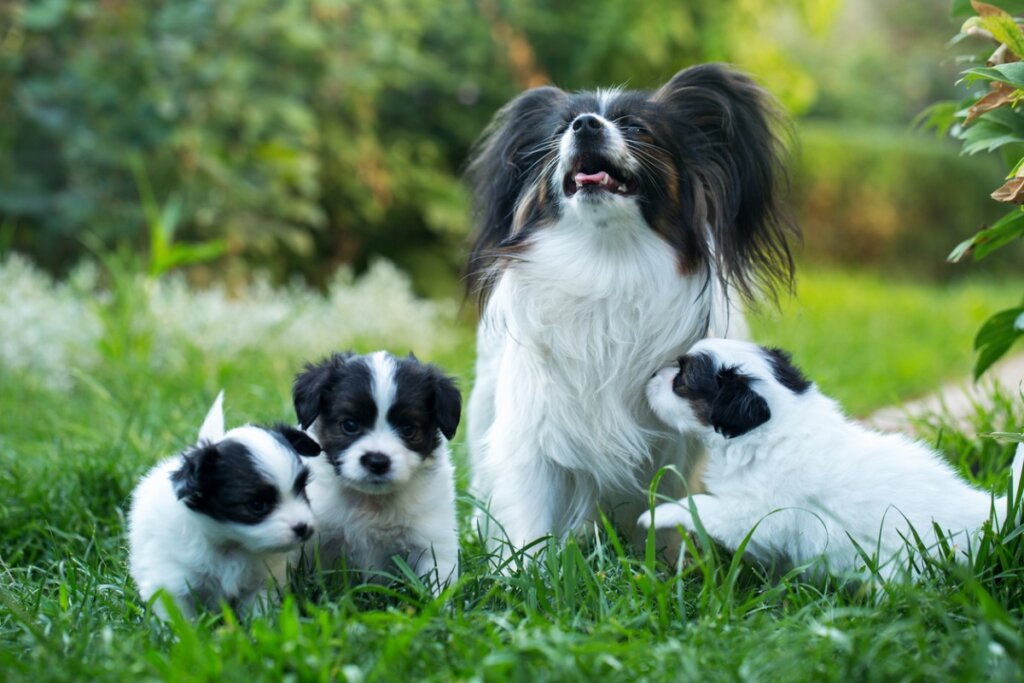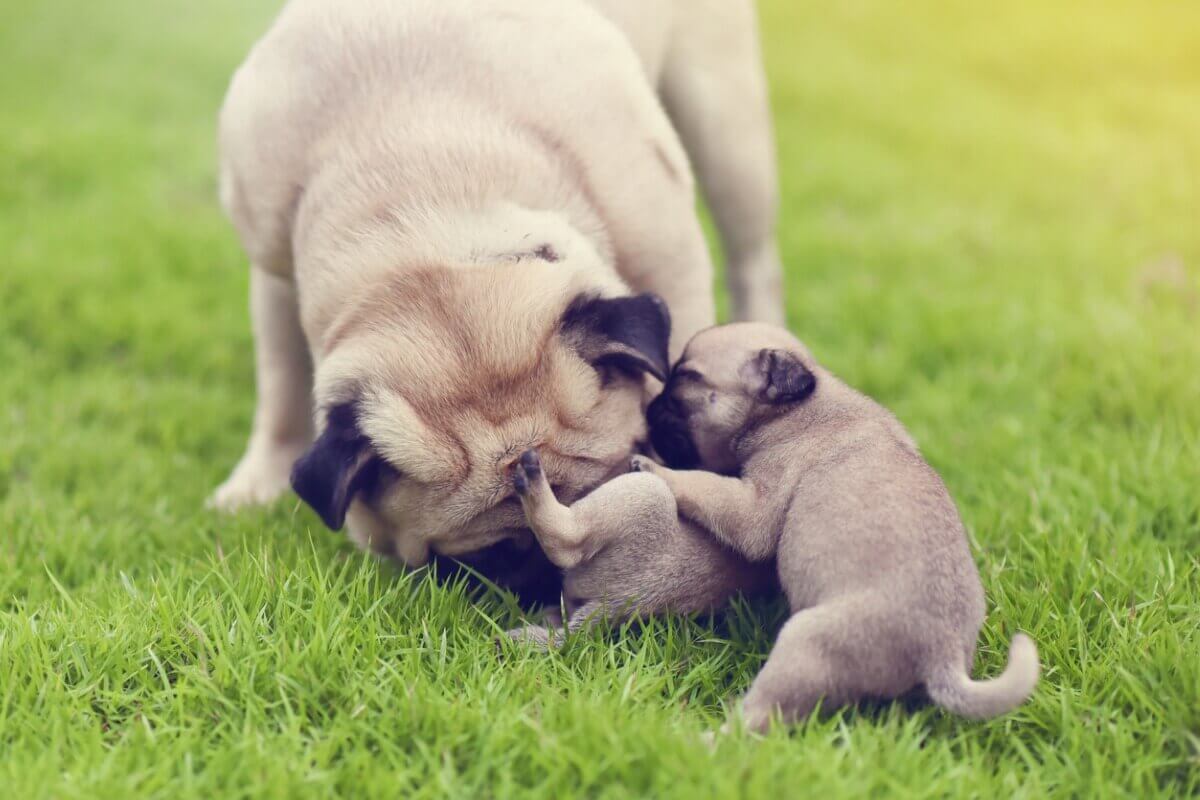What Do I Do If My Dog Misses Her Puppies?

All species that perform parental care establish a maternal-filial bond. This is necessary for the proper development and survival of the offspring, so both offspring and parent will show signs of stress if separated. Therefore, when a dog misses her puppies, intervention should be made to alleviate her discomfort.
Although we know that pups shouldn’t be separated from their mother until they’re ready to be emancipated, there are certain situations that require distance between them, such as certain illnesses. This and other similar scenarios are discussed in the following article, in which you can learn how to handle them in the best possible way for both the mother and her puppies. Keep reading.
What happens if the puppies are separated from the mother?
If you’re thinking of separating the puppies from their mother prematurely, you need to know what the consequences of this act will be. This early separation will negatively affect the puppy’s development and the mother’s mental health. These are the most common dangers you may encounter:
- If all the puppies are removed at once, the accumulation of milk in the breasts can lead to mastitis in the mother.
- The mother’s milk transmits the necessary defenses to the puppies in their first stage of life. Without it, their immune system is impaired.
- The maternal-filial bond establishes the basis for healthy affectivity in the puppy, both in its infancy and in its adult life.
- Without the mother’s nurturing, the puppy will have trouble socializing with other dogs.
- The mother dog misses her puppies, so she suffers anxiety, stress, and deep sadness that may eventually lead to a depressive disorder.

When is it necessary to separate puppies from their mother?
Even with the complications of separating puppies prematurely in mind, sometimes there’s no choice. It’s often necessary in cases where the life of the mother or offspring may be compromised. Here are the most common situations that require this act.
Forced separation due to illness
When a puppy contracts an illness, it’s usually weak and the dog neglects it, which endangers the life of the little one. In addition, the sick puppy could infect its siblings, so it’s best to separate and treat it.
When the puppy returns to its mother, she usually identifies it almost immediately. If the puppy is removed from her, she’ll notice that one is missing and will look for it for a while, so it’s normal for her to receive it well when it returns.
Due to complications after the birth
Sometimes, complications that appear after the birth of the puppies require the puppies to be removed, either to treat the mother or so that she doesn’t transmit any disease or infection to the puppies. Some of the ailments that make this separation necessary are the following:
- Cesarean delivery: It’s not so much that the dog misses her puppies, but that she doesn’t recognize them because her delivery was unnatural. However, the bond is usually reestablished once the mother’s hormones stabilize in the hours after the birth.
- Eclampsia: The mobilization of calcium into the mother’s milk can cause a fall of this mineral in her body, causing convulsions, breathing problems, loss of consciousness, coma, and even death.
- Metritis: This is a bacterial infection that occurs in the uterus for various reasons. It causes fever, lethargy, anorexia, vomiting, diarrhea, and foul-smelling secretions. It’s an emergency because the dog could die.
- Septic mastitis: This infection is a breast infection that causes a lot of pain and can lead to life-threatening sepsis in the mother. The infection is transmitted to the puppies through the milk, so they must be bottle-fed until the mother recovers.
What happens if my dog misses her puppies that died?
There’s an extreme case in which the dog misses her puppies: When they die. Her body has been hormonally prepared for months to establish a bond with her offspring, so losing them is a hard emotional blow.
When this happens, a veterinary follow-up should be done to avoid complications such as mastitis or pyometra. On the psychological side, the mother may need some medication to cope with the situation. However, what the dog will need most is for you to be by her side, shower her with affection, and let her process the grief at her own pace.
Grieving is a normal feeling in the natural world. Let the mother take her time.
When should puppies be separated from their mother?
In the wild, juvenile dogs would separate from their mother on their own when they are ready to fend for themselves. However, in a human family, it’s usually an intentional act, as the young are usually given out to brighten up other homes.
Puppies should never be separated before 8 weeks of age. Although they start eating solid food at 4-5 weeks, the hard diet is usually compatible with nursing and the adaptation process doesn’t have to be interrupted.

If you can keep the puppies with their mother until they learn from her everything they need to know to get along with other dogs, all the better. This will ensure a balanced emotionalism and a set of social skills that will be much more established in young dogs than if they were to learn them on their own or from a human.
All cited sources were thoroughly reviewed by our team to ensure their quality, reliability, currency, and validity. The bibliography of this article was considered reliable and of academic or scientific accuracy.
- De los Reyes, M. (1999). Características y cuidados de la preñez y parto de la perra. TecnoVet, 5(1).
- Kaszak, I., Ruszczak, A., Kanafa, S., Piłaszewicz, O. W., Sacharczuk, M., & Jurka, P. (2018). New insights of canine mastitis‒a review. Animal Science Papers and Reports, 36(1), 33-44.
- Oftedal, O. T. (1984). Lactation in the dog: milk composition and intake by puppies. The Journal of nutrition, 114(5), 803-812.
- Moon, P. F., Erb, H. N., Ludders, J. W., Gleed, R. D., & Pascoe, P. J. (2000). Perioperative risk factors for puppies delivered by cesarean section in the United States and Canada. Journal of the American Animal Hospital Association, 36(4), 359-368.